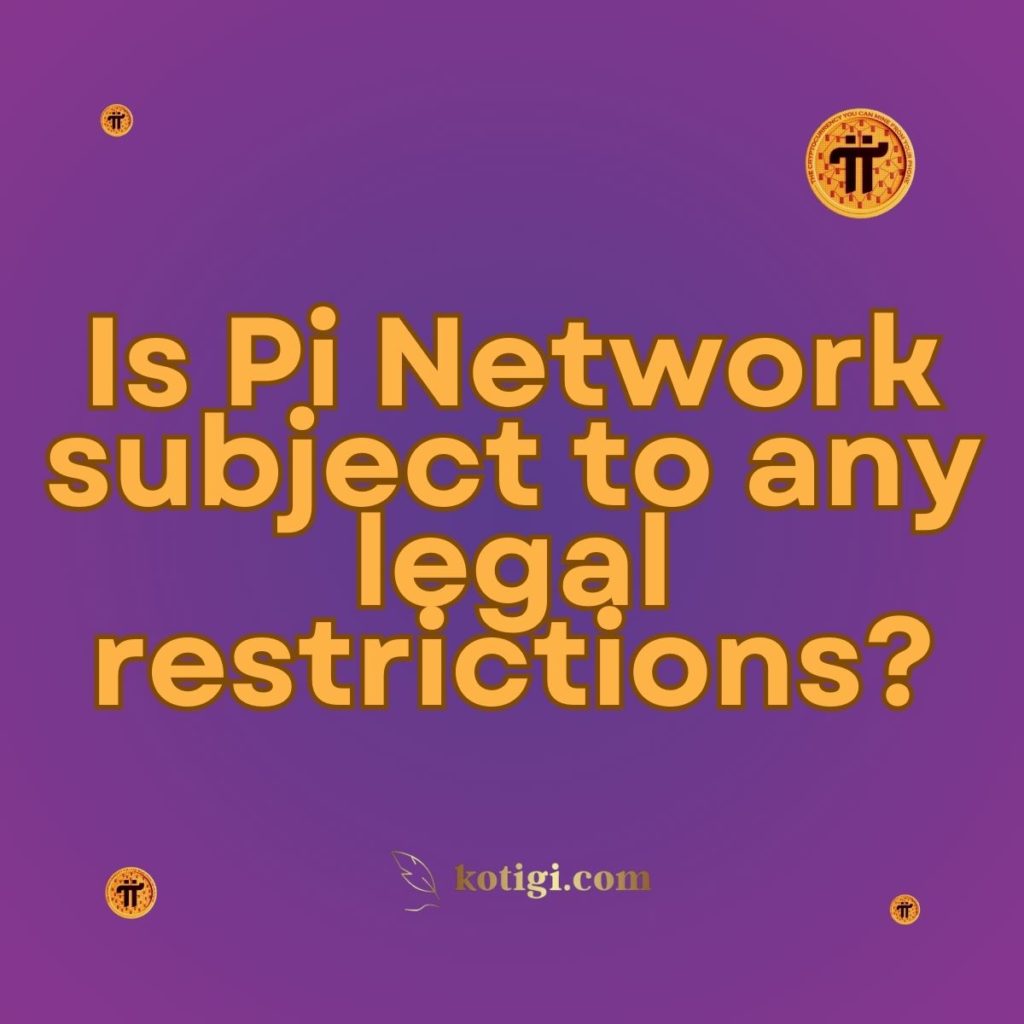
Is Pi Network subject to any legal restrictions?
Pi Network, like many emerging cryptocurrency projects, operates in a complex legal landscape that varies significantly across different countries. Understanding the legal restrictions that may apply to Pi Network is essential for both the developers and users of the platform. Here’s a breakdown of the key legal considerations:
1. Regulatory Environment
1.1. Global Variation in Cryptocurrency Regulation:
Cryptocurrency regulations differ widely from country to country. While some nations have embraced digital currencies and provided clear regulatory frameworks, others have imposed strict controls or outright bans. Pi Network must navigate these varying legal environments to operate effectively and ensure compliance.
1.2. Regulatory Uncertainty:
In many regions, the regulatory status of cryptocurrencies remains unclear. This uncertainty can create challenges for Pi Network, particularly if regulators decide to impose new restrictions or clarify existing laws in ways that impact the network’s operations.
2. Compliance with Local Laws
2.1. Know Your Customer (KYC) and Anti-Money Laundering (AML) Requirements:
Many countries require cryptocurrency platforms to implement KYC and AML measures to prevent illegal activities such as money laundering and fraud. Pi Network has incorporated KYC procedures to comply with these regulations, but the specifics can vary depending on the jurisdiction.
2.2. Securities Laws:
In some countries, regulators may classify certain cryptocurrencies as securities. If Pi coins were to be classified as securities, Pi Network would need to comply with the corresponding regulations, which could include registering with regulatory bodies and providing detailed disclosures to users.
2.3. Consumer Protection Laws:
Consumer protection laws are designed to ensure that users are treated fairly and that their rights are protected. Pi Network must adhere to these laws, particularly in regions with stringent consumer protection standards. This could involve ensuring that users fully understand the risks associated with using the platform and that their data is adequately protected.
3. Legal Restrictions in Specific Countries
3.1. Countries with Cryptocurrency Bans:
Some countries, such as China, have implemented strict bans on cryptocurrency activities. In these regions, the use of Pi Network might be legally restricted or even prohibited. Users in such countries should exercise caution and be aware of the potential legal risks.
3.2. Countries with Strict Regulatory Requirements:
In certain countries, such as the United States and the European Union, regulatory authorities have imposed stringent requirements on cryptocurrency platforms. Pi Network may need to comply with a variety of legal obligations, including data privacy regulations like the GDPR in the EU, to operate in these regions.
4. Intellectual Property and Legal Ownership
4.1. Intellectual Property Rights:
Pi Network, like any technology platform, must respect intellectual property laws. This includes ensuring that the software and other components of the network do not infringe on the intellectual property rights of others. Failure to do so could result in legal disputes or penalties.
4.2. Legal Ownership of Pi Coins:
The legal status of ownership of Pi coins can vary by jurisdiction. In some countries, cryptocurrency assets are recognized as legal property, while in others, their legal status may be less clear. Users should be aware of how their Pi coins are classified under local law, as this can impact their rights and obligations.
5. Potential Legal Challenges
5.1. Regulatory Scrutiny:
As Pi Network grows, it may attract more attention from regulators, particularly if it becomes widely used or if there are concerns about its compliance with local laws. This scrutiny could lead to legal challenges or the imposition of new regulatory requirements.
5.2. Legal Disputes:
Pi Network could face legal disputes from various parties, including users, competitors, or regulatory authorities. These disputes could involve issues such as intellectual property rights, regulatory compliance, or user data privacy.
6. Legal Risk Management
6.1. Proactive Legal Compliance:
Pi Network can mitigate legal risks by proactively complying with applicable laws and regulations. This includes regularly reviewing and updating its policies to ensure they meet current legal standards and working closely with legal experts to navigate complex regulatory environments.
6.2. User Education:
Educating users about the legal aspects of using Pi Network, including any potential restrictions or obligations, is crucial. This can help users make informed decisions and reduce the risk of legal issues arising from misunderstandings or non-compliance.
Conclusion
Pi Network operates in a dynamic and often uncertain legal environment, with varying regulations across different countries. The platform must navigate these legal landscapes carefully to ensure compliance with local laws, including KYC/AML requirements, securities regulations, and consumer protection laws. While there may be legal restrictions in certain countries, Pi Network can manage these risks through proactive compliance, user education, and legal risk management. Users should also stay informed about the legal status of Pi Network in their respective jurisdictions to avoid potential legal issues.




